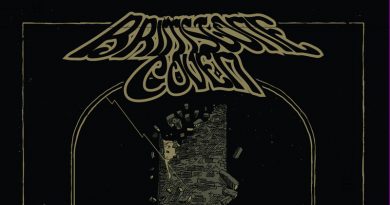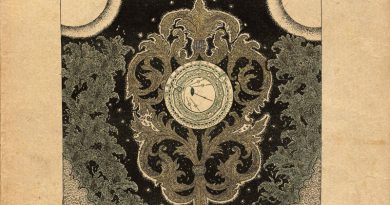Zed ‘Visions Of Dune’ LP Reissue 2014
 I’ll admit that I was never lucky enough to be caught up in Frank Herbert’s admittedly mesmerising spell; Dune was something that piqued my interest briefly in my teens and then fell quickly by the wayside (blame cheap cider and bad horror) but there are times when I feel I’ve sorely missed out. Its influence is a strong presence in music, with bands like Stoneburner and Sayyadina deriving their names from it, while Iron Maiden and Blind Guardian have taken its epic aspects to their heart, but they weren’t the first to give it an audio adaptation a go. Tangerine Dream’s Klaus Schulze released a tribute, Dune, in 1979 but at the same time, a stage designer and lighting technician for prog heavyweights Gong and Magma (and, later, the inventor of the laser harp) was using synths and analogue tape loops to create his own interpretation, Visions Of Dune. That man, Bernard Szajner chose to release it under the unassuming moniker of Z and while it never saw him reach the heady heights of the likes of Brian Eno, whom he is often compared to, it did create enough fans that thirty-five years on, we can get nifty reissues like this.
I’ll admit that I was never lucky enough to be caught up in Frank Herbert’s admittedly mesmerising spell; Dune was something that piqued my interest briefly in my teens and then fell quickly by the wayside (blame cheap cider and bad horror) but there are times when I feel I’ve sorely missed out. Its influence is a strong presence in music, with bands like Stoneburner and Sayyadina deriving their names from it, while Iron Maiden and Blind Guardian have taken its epic aspects to their heart, but they weren’t the first to give it an audio adaptation a go. Tangerine Dream’s Klaus Schulze released a tribute, Dune, in 1979 but at the same time, a stage designer and lighting technician for prog heavyweights Gong and Magma (and, later, the inventor of the laser harp) was using synths and analogue tape loops to create his own interpretation, Visions Of Dune. That man, Bernard Szajner chose to release it under the unassuming moniker of Z and while it never saw him reach the heady heights of the likes of Brian Eno, whom he is often compared to, it did create enough fans that thirty-five years on, we can get nifty reissues like this.
Does it really live up to its ‘long lost classic’ status, though? Well, it does, just about. Right from the opening swishes of Dune, there’s a simple elegance to it and a warmly intelligent charm that can’t be denied. It’s synth-derived ambiance of a calibre that most of Thrill Jockey and Warp’s rosters would sell their kidneys for, and the melodies which do sneak in are reminiscent of early Mike Oldfield in the best possible way. The brief two-fer of Bashar and Thufif Hawat pick up the pace, firstly with some energetic drumwork courtesy of Magma’s Clément Bailly and later with some truly dizzying analogue interplay, and Bene Gesserit is a space-age beauty of fluttering tones and bizarre instrumentation, an endlessly-looped C64 melody with all the bitty appeal of its time framed by subtle, cut-glass twinkling and demented synthesizer histrionics. There’s a touch of the kitsch to its dramatic escalation, but it’s far too easy to get lost in to care.
The creaking undulations of Shaî Hulud originally saw out the end of side A, or ‘First Vision’ as it was originally intended, but given that we are living in the future and therefore a time of rediscovery, the Vision has now been expanded with the addition of The Duke, one of two tracks previously thought lost and now revived for the reissue. Whereas what came before put tone and avant-garde electronics on equal footing with atmosphere, The Duke provides probably the tensest five minutes of the album, a scraping chunk of dark ambiance that melds faint, disembodied voices with an anti-drone aura that pulls everything into emptiness and leaves only disquiet in its wake.
Fremen opens the ‘Second Vision’ with a hyperactive squeal and some Space Invaders bleeps that, again, toe the line between cheese and genius, until the song takes a remarkably funky upturn in its second half, Bailly laying down a fine beat while Szajner brings in his own expressive deviations, and Harkonnen is prog indulgence at its best, or worst, depending on who you ask. It’s odd, and dramatic, and resolutely out there, and it sets the scene for much of the second half of the album as a whole. It’s where Szajner really lets rip, bringing together taut melodies and theatrical knob-twiddling like a Moog-obsessed Victor Frankenstein, and while the fingerprints of Schulze, Eno and Jarre do crop up, it’s still a fun trip. As an adaptation, it should strive to have a sense of drama to it, and it excels in this while never betraying its distinctly outré roots.
The album closes out with its other ‘new’ addition, Spice, and once again this is a tense offering that leans more towards the dark side of electronica than the spry sounds of the ‘Second Vision’, but it makes itself known through an overpoweringly claustrophobic presence. The contrast is strange, to say the leap, but Szajner can be forgiven this one misstep, especially considering that its original placing in the album isn’t known, or whether it even was intended to be included at all.
Visions Of Dune still functions as a curiosity and a stylistic archetype, but it’s also a wonderfully creative synth-prog album that deserves this chance to be heard once again. There’s an organic nature to it that stems from Szajner’s distinctive aestheticism, as well as from his unique method of construction, and even though it is likely a known entity for aficionados of the genre, anyone who digs sci-fi, prog or isn’t afraid of a little exploration will likely find these alien vistas a joy to traverse. I never did get around to reading Dune, but after this I’m starting to feel I should. Good job, Zed, good job.
Label: InFiné Music
Band Links: Official
Scribed by: Dave Bowes



